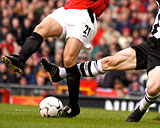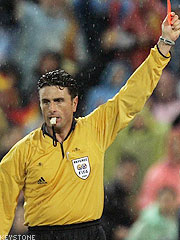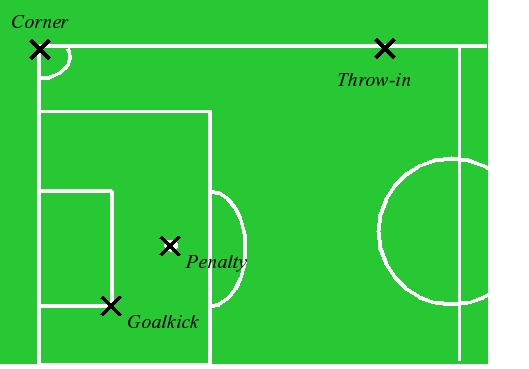Foul Scene
Frames
| A foul | |
| An offense | Foul Offside Simulation |
| A referee intervention | Referee_Decision Sanction Win_Compensation Concede_Compensation |
| Playing the advantage | Advantage |
| Requesting or reacting to a referee intervention | Dissent |
| Set Pieces | Set_Piece |
| Others | Give_Card Receive_Card |
| Related | Award_Goal |
Description
A foulThe foul scenario is centered around the event of a player breaking some rule of the game and the referee reacting to this with an appropriate sanction or compensation. The main protagonists are the offender, the referee and often (but not necessarily) an offended player. The offender commits an offense (a foul, a lack of sportsmanship, a misconduct, an offside position etc.) which may directly involve an offended player. The area where this happens may be mentioned (and may be important because offenses in different parts of the field can have different consequences). The referee spots this offense and punishes it by awarding a compensation to the opponent team (the offended team) of the offender. Additionally, the referee may sanction the offender with a yellow or red card.
An offense

LUs for various types of offenses typically involving two players are assembled in the frame Foul. The frame Offside contains LUs for describing that one or several players are in an offside position.
A player may also simulate a foul in order to win a free-kick or a penalty for his team or in order to provoke a sanction for an opponent. This is in itself an offense which, if recognized by the referee, is usually punished with a yellow or red card. LUs describing this type of event are to be found in the frame Simulation.
A referee intervention

If a referee spots an offense, he makes an intervention. LUs describing a referee intervention in general are to be found in the frame Referee_Decision. LUs describing ways for a referee to sanction a player are assembled in the frame Sanction. Both frames take the perspective of the referee.
LUs in the frame Win_Compensation describe the same event from the point of view of the offended player or team. Conversely, LUs in the frame Concede_Compensation take the offender's or offender's team's perspective.
Playing the advantage
If the referee has spotted an offense, but judges that interrupting the match would be to the further disadvantage of the offended player's team, he may decide not to interrupt the match immediately, but to wait until the current move is completed. This is called "playing the advantage". LUs describing this are to be found in the frame Advantage.
Requesting or reacting to a referee intervention
Frequently, the players or the coach of a team disagree with a referee's decision or think that a referee intervention ought to have taken place when it has not. Some forms of such disagreement constitute offenses in their own right. The LUs describing such actions are to be found in the frame Dissent.
Set Pieces

The compensation awarded by the referee to the offended team after a foul is either a free-kick or a penalty. Likewise, the referee awards a throw-in, a corner or a goalkick to one team after the ball has gone out of play. All these compensations are called set-pieces (or dead ball situations). They are carried out by the executing player, a player from the offended team. LUs for describing set-pieces are to be found in the frame Set_Piece.
Others
The nominal predicates "Yellow Card" or "Red Card" and their variants and translations can be used with a variety of support verb. Those support verbs that describe the corresponding event from the referee's point of view are assembled in the frame Give_Card. Those support verbs that describe the same event from the offender's point of view are in the frame Receive_Card
Related
Another type of referee intervention is the validation of a goal. This is covered in the frame Award_Goal.